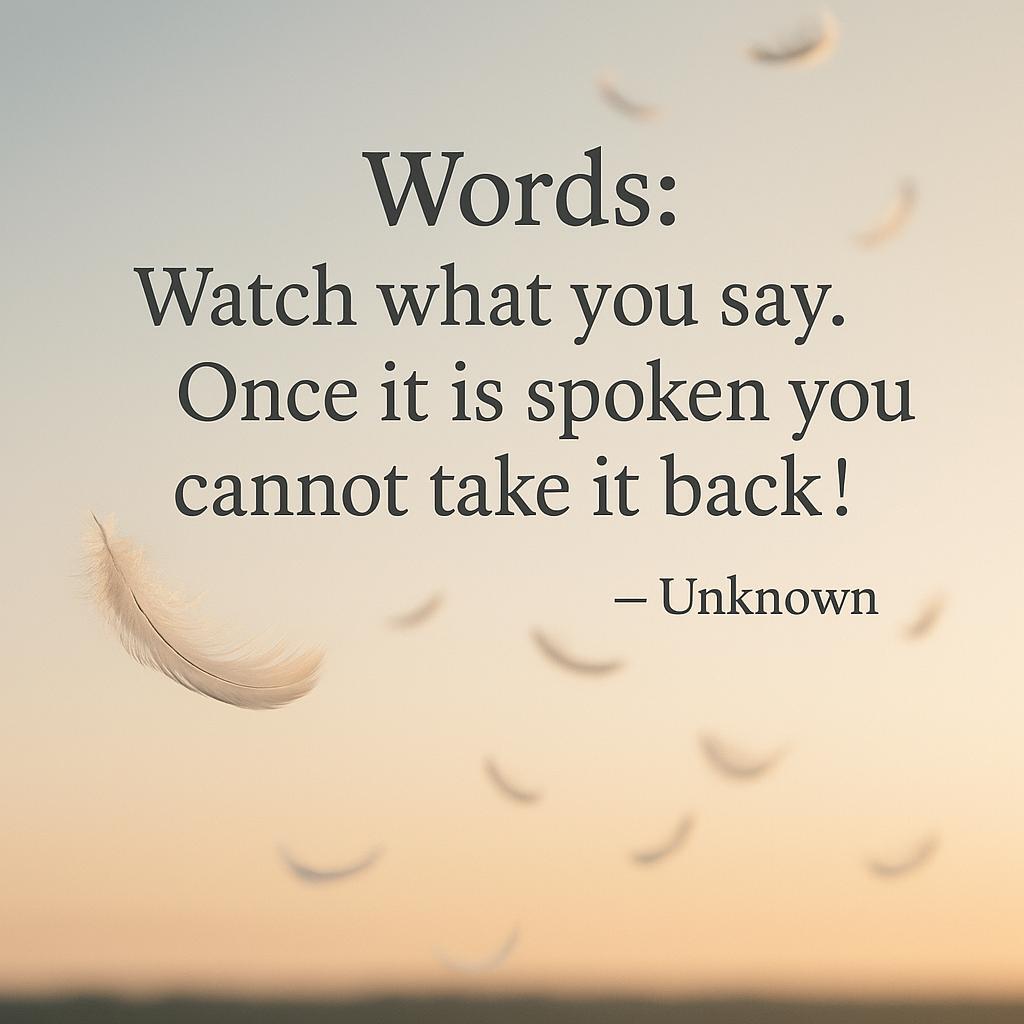
Friday, November 7, 2025
Turn AI Into Your Income Stream
The AI economy is booming, and smart entrepreneurs are already profiting. Subscribe to Mindstream and get instant access to 200+ proven strategies to monetize AI tools like ChatGPT, Midjourney, and more. From content creation to automation services, discover actionable ways to build your AI-powered income. No coding required, just practical strategies that work.
Words: Watch what you say. Once it is spoken you cannot take it back!
Expanded Meaning:
Words are among the most powerful tools we possess. They can build bridges or burn them, inspire hope or cause lasting pain. Once released into the world, words cannot be retrieved—they ripple outward, shaping emotions, memories, and relationships long after they’re spoken.
This quote reminds us that our speech is a reflection of our awareness and self-control. In moments of anger, frustration, or impulsiveness, it’s easy to say something sharp or careless. But those words, though fleeting to the speaker, can echo in someone else’s heart for years. Just as a nail leaves a mark even after being pulled from wood, hurtful words can leave emotional scars even after apologies are made.
Conversely, thoughtful and encouraging words have the power to heal and uplift. A kind remark at the right moment can restore someone’s confidence or renew their hope. This is why mindful communication isn’t just about avoiding harm—it’s about intentionally choosing language that nurtures connection and growth.
The deeper wisdom in this quote is about responsibility. Every conversation is a choice between reaction and reflection. Before speaking, ask yourself: “Will this help or hurt? Will I be proud of these words tomorrow?” Silence, when guided by empathy, often speaks louder than impulsive speech.
Context & Origin:
While the author of this quote remains unknown, its message reflects wisdom shared across time and tradition:
Biblical teaching: “Death and life are in the power of the tongue.” — Proverbs 18:21
Buddhist philosophy: Mindful speech is part of the Noble Eightfold Path, which emphasizes truth, compassion, and restraint.
Stoic philosophy: Thinkers like Epictetus and Marcus Aurelius taught that words should serve reason and virtue, not emotion or ego.
From the ancient sages to modern thinkers, the message is universal: the way we use our words shapes not only our world, but our legacy.

Key Takeaway:
Every word you speak carries energy. Use that energy to uplift, not to wound. Speak with intention, listen with compassion, and let your words become instruments of understanding and peace.
🧭 Resource List: The Power of Words
1. Books on Mindful and Intentional Speech
“The Four Agreements” by Don Miguel Ruiz – Especially the first agreement: Be impeccable with your word. Ruiz shows how words can create freedom or suffering depending on how they’re used.
“Nonviolent Communication: A Language of Life” by Marshall B. Rosenberg – A life-changing guide to communicating with empathy and purpose.
“Think on These Things” by Jiddu Krishnamurti – Encourages deep self-awareness in thought and speech.
“Words That Change Minds” by Shelle Rose Charvet – Explores how subtle shifts in language can motivate, influence, and inspire.
2. Videos & Talks
🎥 Brené Brown – “The Power of Vulnerability” (TED Talk) – Demonstrates how honest, kind communication creates authentic human connection.
🎥 Jay Shetty – “The Words We Speak Become the Worlds We Live In” (YouTube) – A modern reflection on how our vocabulary shapes our mindset and outcomes.
🎥 Thich Nhat Hanh – “Mindful Speech and Deep Listening” – Offers spiritual insight into speaking truthfully with compassion and understanding.
3. Articles & Studies
Harvard Health Publishing: “How Words Can Change Your Brain” – Scientific evidence that positive language enhances brain function and relationships.
Psychology Today: “The Weight of Words” – Discusses how speech influences emotional well-being and self-perception.
Greater Good Science Center: “The Art of Mindful Communication” – Explores empathy and awareness as foundations of constructive conversation.
4. Practical Exercises
✍️ Pause Before You Speak Technique – Before replying, breathe and ask: Is it true? Is it kind? Is it necessary?
💬 Daily Gratitude Affirmations – Start your day with three positive statements aloud; the words you repeat shape your inner world.
🪞 Mirror Exercise – Speak to yourself with kindness each morning. The tone you use internally determines the one you bring into the world.
5. Quotes for Reflection
“Handle them carefully, for words have more power than atom bombs.” — Pearl Strachan Hurd
“Raise your words, not your voice. It is rain that grows flowers, not thunder.” — Rumi
“Kind words can be short and easy to speak, but their echoes are truly endless.” — Mother Teresa
Final Reflection:
Your words are like seeds—you may forget where you’ve scattered them, but they’ll take root somewhere. Speak as if your words will echo forever, because in someone’s heart, they just might.
The best HR advice comes from those in the trenches. That’s what this is: real-world HR insights delivered in a newsletter from Hebba Youssef, a Chief People Officer who’s been there. Practical, real strategies with a dash of humor. Because HR shouldn’t be thankless—and you shouldn’t be alone in it.




